

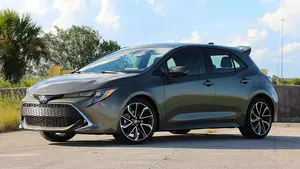
2019 Corolla XII (E210)
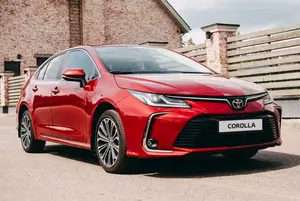
2020 Corolla XII (E210) (US)
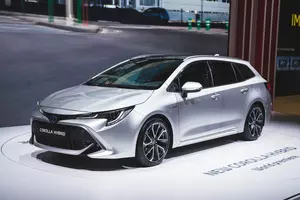
2019 Corolla Touring Sports XII (E210)
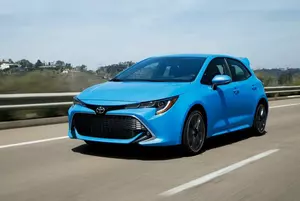
2019 Corolla Hatchback XII (E210)

2017 Corolla Axio XI (facelift 2017)
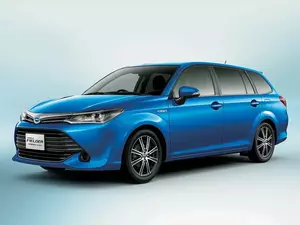
2017 Corolla Fielder XI (facelift 2017)
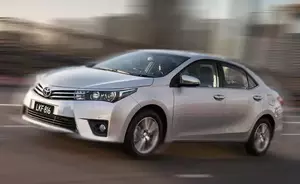
2016 Corolla XI (E170, facelift 2016)
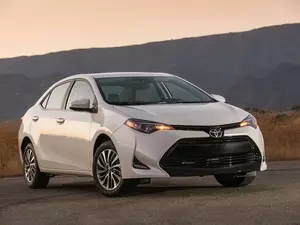
2017 Corolla iM
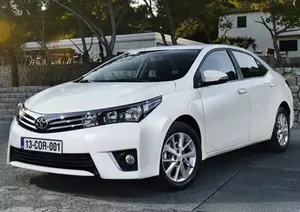
2013 Corolla XI (E170)
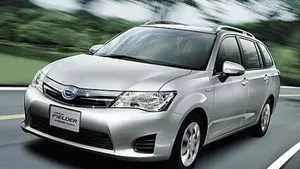
2013 Corolla Fielder XI
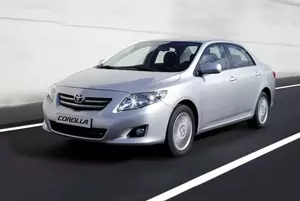
2007 Corolla X (E140, E150)
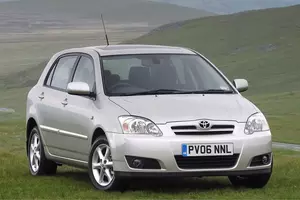
2002 Corolla Hatch IX (E120, E130)
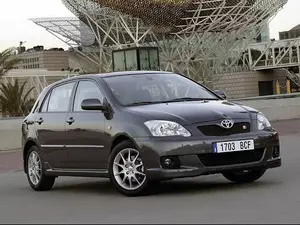
2002 Corolla IX (E120, E130)
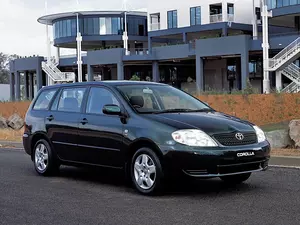
2002 Corolla Wagon IX (E120, E130)
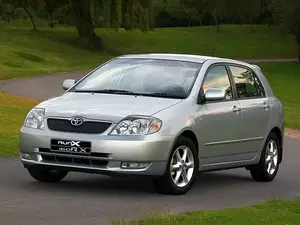
2001 Corolla Runx
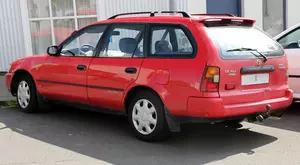
1998 Corolla Wagon VIII (E110)

2000 Corolla Fielder IX
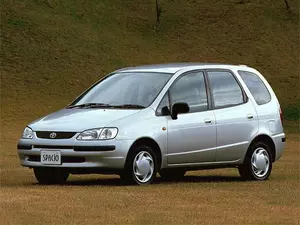
1997 Corolla Spacio VIII (E110)

1998 Corolla Hatch VIII (E110)

1998 Corolla VIII (E110)
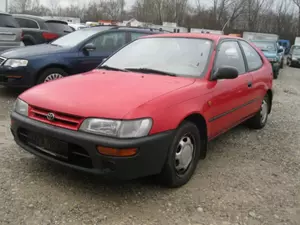
1993 Corolla Compact VII (E100)
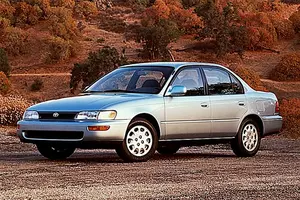
1993 Corolla VII (E100)
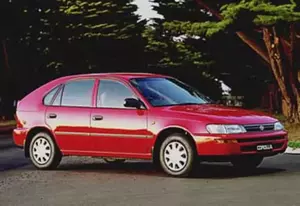
1993 Corolla Hatch VII (E100)
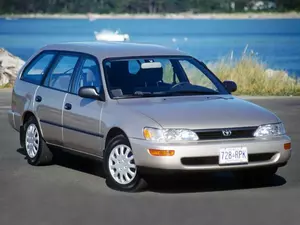
1993 Corolla Wagon VII (E100)
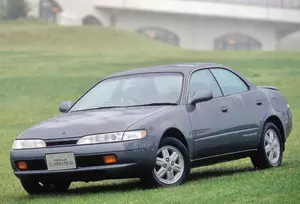
1992 Corolla Ceres
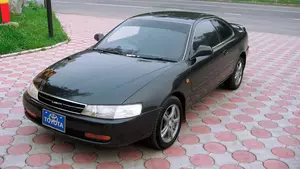
1992 Corolla Levin

1988 Corolla Wagon VI (E90)
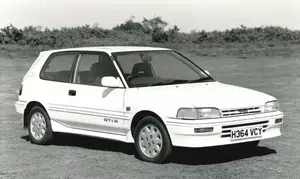
1988 Corolla Hatch VI (E90)
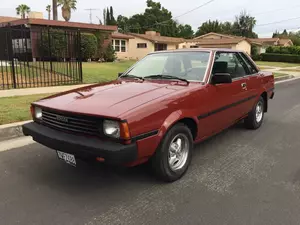
1983 Corolla Coupe V (E80)
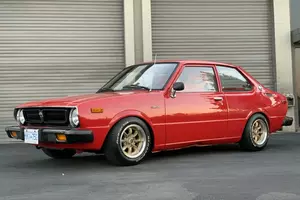
1975 Corolla Coupe III (E30, E40, E50, E60)

| Vehicle | Precise engine size | Difference from world average | Engine size to consumption ratio | Horsepower from 1 L | Engine size to 100 kg of weight |
|---|---|---|---|---|---|
| 1.8 |
1.8 L (1798 cc) |
23.4% smaller | 53 cc to 1 mpg | 78 hp from 1 L | 138 cc to 100 kg |
| 1.6i |
1.6 L (1598 cc) |
31.9% smaller | 39 cc to 1 mpg | 83 hp from 1 L | 123 cc to 100 kg |
| 1.8i |
1.8 L (1798 cc) |
23.4% smaller | 26 cc to 1 mpg | 54 hp from 1 L | 138 cc to 100 kg |
| Vehicle | 1.8 |
|---|---|
| Precise engine size | 1.8 L (1798 cc) |
| Difference from world average | 23.4 smaller |
| Engine size to consumption ratio | 53 cc to 1 mpg |
| Horsepower from 1 L | 78 hp from 1 L |
| Engine size to 100 kg of weight | 138 cc to 100 kg |
| Vehicle | 1.6i |
| Precise engine size | 1.6 L (1598 cc) |
| Difference from world average | 31.9 smaller |
| Engine size to consumption ratio | 39 cc to 1 mpg |
| Horsepower from 1 L | 83 hp from 1 L |
| Engine size to 100 kg of weight | 123 cc to 100 kg |
| Vehicle | 1.8i |
| Precise engine size | 1.8 L (1798 cc) |
| Difference from world average | 23.4 smaller |
| Engine size to consumption ratio | 26 cc to 1 mpg |
| Horsepower from 1 L | 54 hp from 1 L |
| Engine size to 100 kg of weight | 138 cc to 100 kg |

| Vehicle | Precise engine size | Difference from world average | Engine size to consumption ratio | Horsepower from 1 L | Engine size to 100 kg of weight |
|---|---|---|---|---|---|
| 2.0 |
1.99 L (1987 cc) |
15.3% smaller | 58 cc to 1 mpg | 85 hp from 1 L | 142 cc to 100 kg |
| 1.8 |
1.8 L (1798 cc) |
23.4% smaller | 35 cc to 1 mpg | 67 hp from 1 L | 128 cc to 100 kg |
| Vehicle | 2.0 |
|---|---|
| Precise engine size | 1.99 L (1987 cc) |
| Difference from world average | 15.3 smaller |
| Engine size to consumption ratio | 58 cc to 1 mpg |
| Horsepower from 1 L | 85 hp from 1 L |
| Engine size to 100 kg of weight | 142 cc to 100 kg |
| Vehicle | 1.8 |
| Precise engine size | 1.8 L (1798 cc) |
| Difference from world average | 23.4 smaller |
| Engine size to consumption ratio | 35 cc to 1 mpg |
| Horsepower from 1 L | 67 hp from 1 L |
| Engine size to 100 kg of weight | 128 cc to 100 kg |

| Vehicle | Precise engine size | Difference from world average | Engine size to consumption ratio | Horsepower from 1 L | Engine size to 100 kg of weight |
|---|---|---|---|---|---|
| 2.0 |
1.99 L (1986 cc) |
15.3% smaller | 31 cc to 1 mpg | 76 hp from 1 L | 132 cc to 100 kg |
| 1.8i |
1.8 L (1798 cc) |
23.4% smaller | 25 cc to 1 mpg | 54 hp from 1 L | 138 cc to 100 kg |
| 1.2 Turbo |
1.2 L (1197 cc) |
49% smaller | 28 cc to 1 mpg | 97 hp from 1 L | 92 cc to 100 kg |
| Vehicle | 2.0 |
|---|---|
| Precise engine size | 1.99 L (1986 cc) |
| Difference from world average | 15.3 smaller |
| Engine size to consumption ratio | 31 cc to 1 mpg |
| Horsepower from 1 L | 76 hp from 1 L |
| Engine size to 100 kg of weight | 132 cc to 100 kg |
| Vehicle | 1.8i |
| Precise engine size | 1.8 L (1798 cc) |
| Difference from world average | 23.4 smaller |
| Engine size to consumption ratio | 25 cc to 1 mpg |
| Horsepower from 1 L | 54 hp from 1 L |
| Engine size to 100 kg of weight | 138 cc to 100 kg |
| Vehicle | 1.2 Turbo |
| Precise engine size | 1.2 L (1197 cc) |
| Difference from world average | 49 smaller |
| Engine size to consumption ratio | 28 cc to 1 mpg |
| Horsepower from 1 L | 97 hp from 1 L |
| Engine size to 100 kg of weight | 92 cc to 100 kg |

| Vehicle | Precise engine size | Difference from world average | Engine size to consumption ratio | Horsepower from 1 L | Engine size to 100 kg of weight |
|---|---|---|---|---|---|
| 2.0 |
1.99 L (1986 cc) |
15.3% smaller | 32 cc to 1 mpg | 76 hp from 1 L | 142 cc to 100 kg |
| 1.8 |
1.8 L (1798 cc) |
23.4% smaller | 26 cc to 1 mpg | 54 hp from 1 L | 138 cc to 100 kg |
| 1.2 D-4T |
1.2 L (1196 cc) |
49% smaller | - | 97 hp from 1 L | 92 cc to 100 kg |
| Vehicle | 2.0 |
|---|---|
| Precise engine size | 1.99 L (1986 cc) |
| Difference from world average | 15.3 smaller |
| Engine size to consumption ratio | 32 cc to 1 mpg |
| Horsepower from 1 L | 76 hp from 1 L |
| Engine size to 100 kg of weight | 142 cc to 100 kg |
| Vehicle | 1.8 |
| Precise engine size | 1.8 L (1798 cc) |
| Difference from world average | 23.4 smaller |
| Engine size to consumption ratio | 26 cc to 1 mpg |
| Horsepower from 1 L | 54 hp from 1 L |
| Engine size to 100 kg of weight | 138 cc to 100 kg |
| Vehicle | 1.2 D-4T |
| Precise engine size | 1.2 L (1196 cc) |
| Difference from world average | 49 smaller |
| Engine size to consumption ratio | - |
| Horsepower from 1 L | 97 hp from 1 L |
| Engine size to 100 kg of weight | 92 cc to 100 kg |

| Vehicle | Precise engine size | Difference from world average | Engine size to consumption ratio | Horsepower from 1 L | Engine size to 100 kg of weight |
|---|---|---|---|---|---|
| 1.5 |
1.5 L (1496 cc) |
36.2% smaller | - | 49 hp from 1 L | 136 cc to 100 kg |
| 1.3 |
1.33 L (1329 cc) |
43.4% smaller | - | 71 hp from 1 L | 121 cc to 100 kg |
| Vehicle | 1.5 |
|---|---|
| Precise engine size | 1.5 L (1496 cc) |
| Difference from world average | 36.2 smaller |
| Engine size to consumption ratio | - |
| Horsepower from 1 L | 49 hp from 1 L |
| Engine size to 100 kg of weight | 136 cc to 100 kg |
| Vehicle | 1.3 |
| Precise engine size | 1.33 L (1329 cc) |
| Difference from world average | 43.4 smaller |
| Engine size to consumption ratio | - |
| Horsepower from 1 L | 71 hp from 1 L |
| Engine size to 100 kg of weight | 121 cc to 100 kg |

| Vehicle | Precise engine size | Difference from world average | Engine size to consumption ratio | Horsepower from 1 L | Engine size to 100 kg of weight |
|---|---|---|---|---|---|
| 1.5i |
1.5 L (1496 cc) |
36.2% smaller | 18 cc to 1 mpg | 49 hp from 1 L | 125 cc to 100 kg |
| 1.8i |
1.8 L (1797 cc) |
23.4% smaller | 46 cc to 1 mpg | 78 hp from 1 L | 150 cc to 100 kg |
| Vehicle | 1.5i |
|---|---|
| Precise engine size | 1.5 L (1496 cc) |
| Difference from world average | 36.2 smaller |
| Engine size to consumption ratio | 18 cc to 1 mpg |
| Horsepower from 1 L | 49 hp from 1 L |
| Engine size to 100 kg of weight | 125 cc to 100 kg |
| Vehicle | 1.8i |
| Precise engine size | 1.8 L (1797 cc) |
| Difference from world average | 23.4 smaller |
| Engine size to consumption ratio | 46 cc to 1 mpg |
| Horsepower from 1 L | 78 hp from 1 L |
| Engine size to 100 kg of weight | 150 cc to 100 kg |

| Vehicle | Precise engine size | Difference from world average | Engine size to consumption ratio | Horsepower from 1 L | Engine size to 100 kg of weight |
|---|---|---|---|---|---|
| 1.6 Valvematic |
1.6 L (1598 cc) |
31.9% smaller | 38 cc to 1 mpg | 83 hp from 1 L | 145 cc to 100 kg |
| 1.6 Valvematic |
1.6 L (1598 cc) |
31.9% smaller | 41 cc to 1 mpg | 83 hp from 1 L | 145 cc to 100 kg |
| Vehicle | 1.6 Valvematic |
|---|---|
| Precise engine size | 1.6 L (1598 cc) |
| Difference from world average | 31.9 smaller |
| Engine size to consumption ratio | 38 cc to 1 mpg |
| Horsepower from 1 L | 83 hp from 1 L |
| Engine size to 100 kg of weight | 145 cc to 100 kg |
| Vehicle | 1.6 Valvematic |
| Precise engine size | 1.6 L (1598 cc) |
| Difference from world average | 31.9 smaller |
| Engine size to consumption ratio | 41 cc to 1 mpg |
| Horsepower from 1 L | 83 hp from 1 L |
| Engine size to 100 kg of weight | 145 cc to 100 kg |

| Vehicle | Precise engine size | Difference from world average | Engine size to consumption ratio | Horsepower from 1 L | Engine size to 100 kg of weight |
|---|---|---|---|---|---|
| 1.8 |
1.8 L (1798 cc) |
23.4% smaller | 58 cc to 1 mpg | 76 hp from 1 L | 128 cc to 100 kg |
| Vehicle | 1.8 |
|---|---|
| Precise engine size | 1.8 L (1798 cc) |
| Difference from world average | 23.4 smaller |
| Engine size to consumption ratio | 58 cc to 1 mpg |
| Horsepower from 1 L | 76 hp from 1 L |
| Engine size to 100 kg of weight | 128 cc to 100 kg |

| Vehicle | Precise engine size | Difference from world average | Engine size to consumption ratio | Horsepower from 1 L | Engine size to 100 kg of weight |
|---|---|---|---|---|---|
| 1.33 Dual VVT-i |
1.33 L (1329 cc) |
43.4% smaller | 32 cc to 1 mpg | 75 hp from 1 L | 111 cc to 100 kg |
| 1.6 Valvematic |
1.6 L (1598 cc) |
31.9% smaller | 38 cc to 1 mpg | 83 hp from 1 L | 123 cc to 100 kg |
| 1.4 D-4D |
1.36 L (1364 cc) |
41.9% smaller | 24 cc to 1 mpg | 66 hp from 1 L | 105 cc to 100 kg |
| Vehicle | 1.33 Dual VVT-i |
|---|---|
| Precise engine size | 1.33 L (1329 cc) |
| Difference from world average | 43.4 smaller |
| Engine size to consumption ratio | 32 cc to 1 mpg |
| Horsepower from 1 L | 75 hp from 1 L |
| Engine size to 100 kg of weight | 111 cc to 100 kg |
| Vehicle | 1.6 Valvematic |
| Precise engine size | 1.6 L (1598 cc) |
| Difference from world average | 31.9 smaller |
| Engine size to consumption ratio | 38 cc to 1 mpg |
| Horsepower from 1 L | 83 hp from 1 L |
| Engine size to 100 kg of weight | 123 cc to 100 kg |
| Vehicle | 1.4 D-4D |
| Precise engine size | 1.36 L (1364 cc) |
| Difference from world average | 41.9 smaller |
| Engine size to consumption ratio | 24 cc to 1 mpg |
| Horsepower from 1 L | 66 hp from 1 L |
| Engine size to 100 kg of weight | 105 cc to 100 kg |

| Vehicle | Precise engine size | Difference from world average | Engine size to consumption ratio | Horsepower from 1 L | Engine size to 100 kg of weight |
|---|---|---|---|---|---|
| 1.5i |
1.5 L (1497 cc) |
36.2% smaller | - | 73 hp from 1 L | 136 cc to 100 kg |
| 1.8i |
1.8 L (1798 cc) |
23.4% smaller | - | 78 hp from 1 L | 150 cc to 100 kg |
| Vehicle | 1.5i |
|---|---|
| Precise engine size | 1.5 L (1497 cc) |
| Difference from world average | 36.2 smaller |
| Engine size to consumption ratio | - |
| Horsepower from 1 L | 73 hp from 1 L |
| Engine size to 100 kg of weight | 136 cc to 100 kg |
| Vehicle | 1.8i |
| Precise engine size | 1.8 L (1798 cc) |
| Difference from world average | 23.4 smaller |
| Engine size to consumption ratio | - |
| Horsepower from 1 L | 78 hp from 1 L |
| Engine size to 100 kg of weight | 150 cc to 100 kg |

| Vehicle | Precise engine size | Difference from world average | Engine size to consumption ratio | Horsepower from 1 L | Engine size to 100 kg of weight |
|---|---|---|---|---|---|
| 1.3 i 16V VVT-i |
1.33 L (1329 cc) |
43.4% smaller | 32 cc to 1 mpg | 76 hp from 1 L | 102 cc to 100 kg |
| 1.6 i 16V VVT-i |
1.6 L (1598 cc) |
31.9% smaller | 47 cc to 1 mpg | 78 hp from 1 L | 123 cc to 100 kg |
| 2.0 D-4D |
2 L (1998 cc) |
14.8% smaller | 45 cc to 1 mpg | 63 hp from 1 L | 143 cc to 100 kg |
| 1.4 D-4D |
1.36 L (1364 cc) |
41.9% smaller | 28 cc to 1 mpg | 66 hp from 1 L | 105 cc to 100 kg |
| Vehicle | 1.3 i 16V VVT-i |
|---|---|
| Precise engine size | 1.33 L (1329 cc) |
| Difference from world average | 43.4 smaller |
| Engine size to consumption ratio | 32 cc to 1 mpg |
| Horsepower from 1 L | 76 hp from 1 L |
| Engine size to 100 kg of weight | 102 cc to 100 kg |
| Vehicle | 1.6 i 16V VVT-i |
| Precise engine size | 1.6 L (1598 cc) |
| Difference from world average | 31.9 smaller |
| Engine size to consumption ratio | 47 cc to 1 mpg |
| Horsepower from 1 L | 78 hp from 1 L |
| Engine size to 100 kg of weight | 123 cc to 100 kg |
| Vehicle | 2.0 D-4D |
| Precise engine size | 2 L (1998 cc) |
| Difference from world average | 14.8 smaller |
| Engine size to consumption ratio | 45 cc to 1 mpg |
| Horsepower from 1 L | 63 hp from 1 L |
| Engine size to 100 kg of weight | 143 cc to 100 kg |
| Vehicle | 1.4 D-4D |
| Precise engine size | 1.36 L (1364 cc) |
| Difference from world average | 41.9 smaller |
| Engine size to consumption ratio | 28 cc to 1 mpg |
| Horsepower from 1 L | 66 hp from 1 L |
| Engine size to 100 kg of weight | 105 cc to 100 kg |

| Vehicle | Precise engine size | Difference from world average | Engine size to consumption ratio | Horsepower from 1 L | Engine size to 100 kg of weight |
|---|---|---|---|---|---|
| 1.4 D-4D |
1.36 L (1364 cc) |
41.9% smaller | 31 cc to 1 mpg | 66 hp from 1 L | 114 cc to 100 kg |
| 1.4 i 16V |
1.4 L (1398 cc) |
40.4% smaller | - | 69 hp from 1 L | 127 cc to 100 kg |
| 1.6i 16V |
1.6 L (1598 cc) |
31.9% smaller | 53 cc to 1 mpg | 69 hp from 1 L | 145 cc to 100 kg |
| 2.0 D-4D |
2 L (1995 cc) |
15% smaller | - | 45 hp from 1 L | 153 cc to 100 kg |
| 1.8 i 16V T-Sport |
1.8 L (1796 cc) |
23.4% smaller | - | 107 hp from 1 L | 150 cc to 100 kg |
| Vehicle | 1.4 D-4D |
|---|---|
| Precise engine size | 1.36 L (1364 cc) |
| Difference from world average | 41.9 smaller |
| Engine size to consumption ratio | 31 cc to 1 mpg |
| Horsepower from 1 L | 66 hp from 1 L |
| Engine size to 100 kg of weight | 114 cc to 100 kg |
| Vehicle | 1.4 i 16V |
| Precise engine size | 1.4 L (1398 cc) |
| Difference from world average | 40.4 smaller |
| Engine size to consumption ratio | - |
| Horsepower from 1 L | 69 hp from 1 L |
| Engine size to 100 kg of weight | 127 cc to 100 kg |
| Vehicle | 1.6i 16V |
| Precise engine size | 1.6 L (1598 cc) |
| Difference from world average | 31.9 smaller |
| Engine size to consumption ratio | 53 cc to 1 mpg |
| Horsepower from 1 L | 69 hp from 1 L |
| Engine size to 100 kg of weight | 145 cc to 100 kg |
| Vehicle | 2.0 D-4D |
| Precise engine size | 2 L (1995 cc) |
| Difference from world average | 15 smaller |
| Engine size to consumption ratio | - |
| Horsepower from 1 L | 45 hp from 1 L |
| Engine size to 100 kg of weight | 153 cc to 100 kg |
| Vehicle | 1.8 i 16V T-Sport |
| Precise engine size | 1.8 L (1796 cc) |
| Difference from world average | 23.4 smaller |
| Engine size to consumption ratio | - |
| Horsepower from 1 L | 107 hp from 1 L |
| Engine size to 100 kg of weight | 150 cc to 100 kg |

| Vehicle | Precise engine size | Difference from world average | Engine size to consumption ratio | Horsepower from 1 L | Engine size to 100 kg of weight |
|---|---|---|---|---|---|
| 1.4 i 16V |
1.4 L (1398 cc) |
40.4% smaller | - | 69 hp from 1 L | 127 cc to 100 kg |
| 1.6i 16V |
1.6 L (1598 cc) |
31.9% smaller | 52 cc to 1 mpg | 69 hp from 1 L | 145 cc to 100 kg |
| 1.4 D-4D |
1.36 L (1364 cc) |
41.9% smaller | - | 66 hp from 1 L | 114 cc to 100 kg |
| 2.0 D-4D |
2 L (1995 cc) |
15% smaller | - | 45 hp from 1 L | 166 cc to 100 kg |
| Vehicle | 1.4 i 16V |
|---|---|
| Precise engine size | 1.4 L (1398 cc) |
| Difference from world average | 40.4 smaller |
| Engine size to consumption ratio | - |
| Horsepower from 1 L | 69 hp from 1 L |
| Engine size to 100 kg of weight | 127 cc to 100 kg |
| Vehicle | 1.6i 16V |
| Precise engine size | 1.6 L (1598 cc) |
| Difference from world average | 31.9 smaller |
| Engine size to consumption ratio | 52 cc to 1 mpg |
| Horsepower from 1 L | 69 hp from 1 L |
| Engine size to 100 kg of weight | 145 cc to 100 kg |
| Vehicle | 1.4 D-4D |
| Precise engine size | 1.36 L (1364 cc) |
| Difference from world average | 41.9 smaller |
| Engine size to consumption ratio | - |
| Horsepower from 1 L | 66 hp from 1 L |
| Engine size to 100 kg of weight | 114 cc to 100 kg |
| Vehicle | 2.0 D-4D |
| Precise engine size | 2 L (1995 cc) |
| Difference from world average | 15 smaller |
| Engine size to consumption ratio | - |
| Horsepower from 1 L | 45 hp from 1 L |
| Engine size to 100 kg of weight | 166 cc to 100 kg |

| Vehicle | Precise engine size | Difference from world average | Engine size to consumption ratio | Horsepower from 1 L | Engine size to 100 kg of weight |
|---|---|---|---|---|---|
| 1.4 i 16V |
1.4 L (1398 cc) |
40.4% smaller | - | 69 hp from 1 L | 117 cc to 100 kg |
| 1.4 D-4D |
1.36 L (1364 cc) |
41.9% smaller | - | 66 hp from 1 L | 114 cc to 100 kg |
| 2.0 D-4D |
2 L (1995 cc) |
15% smaller | - | 45 hp from 1 L | 153 cc to 100 kg |
| 1.6i 16V |
1.6 L (1598 cc) |
31.9% smaller | - | 69 hp from 1 L | 133 cc to 100 kg |
| Vehicle | 1.4 i 16V |
|---|---|
| Precise engine size | 1.4 L (1398 cc) |
| Difference from world average | 40.4 smaller |
| Engine size to consumption ratio | - |
| Horsepower from 1 L | 69 hp from 1 L |
| Engine size to 100 kg of weight | 117 cc to 100 kg |
| Vehicle | 1.4 D-4D |
| Precise engine size | 1.36 L (1364 cc) |
| Difference from world average | 41.9 smaller |
| Engine size to consumption ratio | - |
| Horsepower from 1 L | 66 hp from 1 L |
| Engine size to 100 kg of weight | 114 cc to 100 kg |
| Vehicle | 2.0 D-4D |
| Precise engine size | 2 L (1995 cc) |
| Difference from world average | 15 smaller |
| Engine size to consumption ratio | - |
| Horsepower from 1 L | 45 hp from 1 L |
| Engine size to 100 kg of weight | 153 cc to 100 kg |
| Vehicle | 1.6i 16V |
| Precise engine size | 1.6 L (1598 cc) |
| Difference from world average | 31.9 smaller |
| Engine size to consumption ratio | - |
| Horsepower from 1 L | 69 hp from 1 L |
| Engine size to 100 kg of weight | 133 cc to 100 kg |

| Vehicle | Precise engine size | Difference from world average | Engine size to consumption ratio | Horsepower from 1 L | Engine size to 100 kg of weight |
|---|---|---|---|---|---|
| 1.5i |
1.5 L (1496 cc) |
36.2% smaller | - | 73 hp from 1 L | 136 cc to 100 kg |
| 1.8i |
1.79 L (1794 cc) |
23.5% smaller | - | 76 hp from 1 L | 163 cc to 100 kg |
| Vehicle | 1.5i |
|---|---|
| Precise engine size | 1.5 L (1496 cc) |
| Difference from world average | 36.2 smaller |
| Engine size to consumption ratio | - |
| Horsepower from 1 L | 73 hp from 1 L |
| Engine size to 100 kg of weight | 136 cc to 100 kg |
| Vehicle | 1.8i |
| Precise engine size | 1.79 L (1794 cc) |
| Difference from world average | 23.5 smaller |
| Engine size to consumption ratio | - |
| Horsepower from 1 L | 76 hp from 1 L |
| Engine size to 100 kg of weight | 163 cc to 100 kg |

| Vehicle | Precise engine size | Difference from world average | Engine size to consumption ratio | Horsepower from 1 L | Engine size to 100 kg of weight |
|---|---|---|---|---|---|
| 1.3 i 16V |
1.33 L (1332 cc) |
43.2% smaller | - | 65 hp from 1 L | 121 cc to 100 kg |
| 1.6 i 16V |
1.59 L (1587 cc) |
32.4% smaller | - | 69 hp from 1 L | 144 cc to 100 kg |
| 1.8 i 16V 4WD |
1.76 L (1762 cc) |
24.9% smaller | - | 63 hp from 1 L | 136 cc to 100 kg |
| 2.0 D |
1.98 L (1975 cc) |
15.8% smaller | - | 36 hp from 1 L | 165 cc to 100 kg |
| 2.0 D-4D |
2 L (1995 cc) |
15% smaller | 53 cc to 1 mpg | 45 hp from 1 L | 153 cc to 100 kg |
| Vehicle | 1.3 i 16V |
|---|---|
| Precise engine size | 1.33 L (1332 cc) |
| Difference from world average | 43.2 smaller |
| Engine size to consumption ratio | - |
| Horsepower from 1 L | 65 hp from 1 L |
| Engine size to 100 kg of weight | 121 cc to 100 kg |
| Vehicle | 1.6 i 16V |
| Precise engine size | 1.59 L (1587 cc) |
| Difference from world average | 32.4 smaller |
| Engine size to consumption ratio | - |
| Horsepower from 1 L | 69 hp from 1 L |
| Engine size to 100 kg of weight | 144 cc to 100 kg |
| Vehicle | 1.8 i 16V 4WD |
| Precise engine size | 1.76 L (1762 cc) |
| Difference from world average | 24.9 smaller |
| Engine size to consumption ratio | - |
| Horsepower from 1 L | 63 hp from 1 L |
| Engine size to 100 kg of weight | 136 cc to 100 kg |
| Vehicle | 2.0 D |
| Precise engine size | 1.98 L (1975 cc) |
| Difference from world average | 15.8 smaller |
| Engine size to consumption ratio | - |
| Horsepower from 1 L | 36 hp from 1 L |
| Engine size to 100 kg of weight | 165 cc to 100 kg |
| Vehicle | 2.0 D-4D |
| Precise engine size | 2 L (1995 cc) |
| Difference from world average | 15 smaller |
| Engine size to consumption ratio | 53 cc to 1 mpg |
| Horsepower from 1 L | 45 hp from 1 L |
| Engine size to 100 kg of weight | 153 cc to 100 kg |

| Vehicle | Precise engine size | Difference from world average | Engine size to consumption ratio | Horsepower from 1 L | Engine size to 100 kg of weight |
|---|---|---|---|---|---|
| 1.5i |
1.5 L (1496 cc) |
36.2% smaller | - | 73 hp from 1 L | 136 cc to 100 kg |
| 1.8i |
1.79 L (1794 cc) |
23.5% smaller | - | 76 hp from 1 L | 163 cc to 100 kg |
| 2.2 d |
2.18 L (2184 cc) |
6.9% smaller | - | 36 hp from 1 L | 182 cc to 100 kg |
| Vehicle | 1.5i |
|---|---|
| Precise engine size | 1.5 L (1496 cc) |
| Difference from world average | 36.2 smaller |
| Engine size to consumption ratio | - |
| Horsepower from 1 L | 73 hp from 1 L |
| Engine size to 100 kg of weight | 136 cc to 100 kg |
| Vehicle | 1.8i |
| Precise engine size | 1.79 L (1794 cc) |
| Difference from world average | 23.5 smaller |
| Engine size to consumption ratio | - |
| Horsepower from 1 L | 76 hp from 1 L |
| Engine size to 100 kg of weight | 163 cc to 100 kg |
| Vehicle | 2.2 d |
| Precise engine size | 2.18 L (2184 cc) |
| Difference from world average | 6.9 smaller |
| Engine size to consumption ratio | - |
| Horsepower from 1 L | 36 hp from 1 L |
| Engine size to 100 kg of weight | 182 cc to 100 kg |

| Vehicle | Precise engine size | Difference from world average | Engine size to consumption ratio | Horsepower from 1 L | Engine size to 100 kg of weight |
|---|---|---|---|---|---|
| 1.6i |
1.59 L (1587 cc) |
32.4% smaller | - | 69 hp from 1 L | - |
| 1.8i |
1.79 L (1794 cc) |
23.5% smaller | - | 70 hp from 1 L | - |
| Vehicle | 1.6i |
|---|---|
| Precise engine size | 1.59 L (1587 cc) |
| Difference from world average | 32.4 smaller |
| Engine size to consumption ratio | - |
| Horsepower from 1 L | 69 hp from 1 L |
| Engine size to 100 kg of weight | - |
| Vehicle | 1.8i |
| Precise engine size | 1.79 L (1794 cc) |
| Difference from world average | 23.5 smaller |
| Engine size to consumption ratio | - |
| Horsepower from 1 L | 70 hp from 1 L |
| Engine size to 100 kg of weight | - |

| Vehicle | Precise engine size | Difference from world average | Engine size to consumption ratio | Horsepower from 1 L | Engine size to 100 kg of weight |
|---|---|---|---|---|---|
| 1.3 i 16V |
1.33 L (1332 cc) |
43.2% smaller | - | 65 hp from 1 L | 121 cc to 100 kg |
| 2.0 D |
1.98 L (1975 cc) |
15.8% smaller | - | 36 hp from 1 L | 165 cc to 100 kg |
| 1.6 i 16V |
1.59 L (1587 cc) |
32.4% smaller | - | 69 hp from 1 L | 144 cc to 100 kg |
| Vehicle | 1.3 i 16V |
|---|---|
| Precise engine size | 1.33 L (1332 cc) |
| Difference from world average | 43.2 smaller |
| Engine size to consumption ratio | - |
| Horsepower from 1 L | 65 hp from 1 L |
| Engine size to 100 kg of weight | 121 cc to 100 kg |
| Vehicle | 2.0 D |
| Precise engine size | 1.98 L (1975 cc) |
| Difference from world average | 15.8 smaller |
| Engine size to consumption ratio | - |
| Horsepower from 1 L | 36 hp from 1 L |
| Engine size to 100 kg of weight | 165 cc to 100 kg |
| Vehicle | 1.6 i 16V |
| Precise engine size | 1.59 L (1587 cc) |
| Difference from world average | 32.4 smaller |
| Engine size to consumption ratio | - |
| Horsepower from 1 L | 69 hp from 1 L |
| Engine size to 100 kg of weight | 144 cc to 100 kg |

| Vehicle | Precise engine size | Difference from world average | Engine size to consumption ratio | Horsepower from 1 L | Engine size to 100 kg of weight |
|---|---|---|---|---|---|
| 1.4 |
1.33 L (1332 cc) |
43.2% smaller | - | 65 hp from 1 L | 133 cc to 100 kg |
| 1.6 |
1.59 L (1587 cc) |
32.4% smaller | - | 69 hp from 1 L | 144 cc to 100 kg |
| 2.0 D |
1.98 L (1975 cc) |
15.8% smaller | - | 36 hp from 1 L | 165 cc to 100 kg |
| Vehicle | 1.4 |
|---|---|
| Precise engine size | 1.33 L (1332 cc) |
| Difference from world average | 43.2 smaller |
| Engine size to consumption ratio | - |
| Horsepower from 1 L | 65 hp from 1 L |
| Engine size to 100 kg of weight | 133 cc to 100 kg |
| Vehicle | 1.6 |
| Precise engine size | 1.59 L (1587 cc) |
| Difference from world average | 32.4 smaller |
| Engine size to consumption ratio | - |
| Horsepower from 1 L | 69 hp from 1 L |
| Engine size to 100 kg of weight | 144 cc to 100 kg |
| Vehicle | 2.0 D |
| Precise engine size | 1.98 L (1975 cc) |
| Difference from world average | 15.8 smaller |
| Engine size to consumption ratio | - |
| Horsepower from 1 L | 36 hp from 1 L |
| Engine size to 100 kg of weight | 165 cc to 100 kg |

| Vehicle | Precise engine size | Difference from world average | Engine size to consumption ratio | Horsepower from 1 L | Engine size to 100 kg of weight |
|---|---|---|---|---|---|
| 1.3 i 16V XLi |
1.3 L (1299 cc) |
44.6% smaller | 37 cc to 1 mpg | 68 hp from 1 L | 130 cc to 100 kg |
| 1.4i 16V XLi |
1.33 L (1332 cc) |
43.2% smaller | 38 cc to 1 mpg | 56 hp from 1 L | 83 cc to 100 kg |
| 1.6 i 16V Si |
1.59 L (1587 cc) |
32.4% smaller | 50 cc to 1 mpg | 72 hp from 1 L | 144 cc to 100 kg |
| 2.0 D XL |
1.98 L (1975 cc) |
15.8% smaller | 47 cc to 1 mpg | 36 hp from 1 L | 180 cc to 100 kg |
| Vehicle | 1.3 i 16V XLi |
|---|---|
| Precise engine size | 1.3 L (1299 cc) |
| Difference from world average | 44.6 smaller |
| Engine size to consumption ratio | 37 cc to 1 mpg |
| Horsepower from 1 L | 68 hp from 1 L |
| Engine size to 100 kg of weight | 130 cc to 100 kg |
| Vehicle | 1.4i 16V XLi |
| Precise engine size | 1.33 L (1332 cc) |
| Difference from world average | 43.2 smaller |
| Engine size to consumption ratio | 38 cc to 1 mpg |
| Horsepower from 1 L | 56 hp from 1 L |
| Engine size to 100 kg of weight | 83 cc to 100 kg |
| Vehicle | 1.6 i 16V Si |
| Precise engine size | 1.59 L (1587 cc) |
| Difference from world average | 32.4 smaller |
| Engine size to consumption ratio | 50 cc to 1 mpg |
| Horsepower from 1 L | 72 hp from 1 L |
| Engine size to 100 kg of weight | 144 cc to 100 kg |
| Vehicle | 2.0 D XL |
| Precise engine size | 1.98 L (1975 cc) |
| Difference from world average | 15.8 smaller |
| Engine size to consumption ratio | 47 cc to 1 mpg |
| Horsepower from 1 L | 36 hp from 1 L |
| Engine size to 100 kg of weight | 180 cc to 100 kg |

| Vehicle | Precise engine size | Difference from world average | Engine size to consumption ratio | Horsepower from 1 L | Engine size to 100 kg of weight |
|---|---|---|---|---|---|
| 1.3 XLI |
1.33 L (1332 cc) |
43.2% smaller | 38 cc to 1 mpg | 56 hp from 1 L | 133 cc to 100 kg |
| 1.3 XLI 16V |
1.3 L (1299 cc) |
44.6% smaller | 37 cc to 1 mpg | 68 hp from 1 L | 130 cc to 100 kg |
| 1.6 Si |
1.59 L (1587 cc) |
32.4% smaller | 51 cc to 1 mpg | 72 hp from 1 L | 159 cc to 100 kg |
| 2.0 D |
1.98 L (1975 cc) |
15.8% smaller | 49 cc to 1 mpg | 36 hp from 1 L | 198 cc to 100 kg |
| Vehicle | 1.3 XLI |
|---|---|
| Precise engine size | 1.33 L (1332 cc) |
| Difference from world average | 43.2 smaller |
| Engine size to consumption ratio | 38 cc to 1 mpg |
| Horsepower from 1 L | 56 hp from 1 L |
| Engine size to 100 kg of weight | 133 cc to 100 kg |
| Vehicle | 1.3 XLI 16V |
| Precise engine size | 1.3 L (1299 cc) |
| Difference from world average | 44.6 smaller |
| Engine size to consumption ratio | 37 cc to 1 mpg |
| Horsepower from 1 L | 68 hp from 1 L |
| Engine size to 100 kg of weight | 130 cc to 100 kg |
| Vehicle | 1.6 Si |
| Precise engine size | 1.59 L (1587 cc) |
| Difference from world average | 32.4 smaller |
| Engine size to consumption ratio | 51 cc to 1 mpg |
| Horsepower from 1 L | 72 hp from 1 L |
| Engine size to 100 kg of weight | 159 cc to 100 kg |
| Vehicle | 2.0 D |
| Precise engine size | 1.98 L (1975 cc) |
| Difference from world average | 15.8 smaller |
| Engine size to consumption ratio | 49 cc to 1 mpg |
| Horsepower from 1 L | 36 hp from 1 L |
| Engine size to 100 kg of weight | 198 cc to 100 kg |

| Vehicle | Precise engine size | Difference from world average | Engine size to consumption ratio | Horsepower from 1 L | Engine size to 100 kg of weight |
|---|---|---|---|---|---|
| 1.4 i 16V XLi |
1.3 L (1299 cc) |
44.6% smaller | 37 cc to 1 mpg | 68 hp from 1 L | 118 cc to 100 kg |
| 1.6 i 16V GLi |
1.59 L (1587 cc) |
32.4% smaller | 50 cc to 1 mpg | 72 hp from 1 L | 144 cc to 100 kg |
| 2.0 D XL |
1.98 L (1975 cc) |
15.8% smaller | 47 cc to 1 mpg | 36 hp from 1 L | 165 cc to 100 kg |
| Vehicle | 1.4 i 16V XLi |
|---|---|
| Precise engine size | 1.3 L (1299 cc) |
| Difference from world average | 44.6 smaller |
| Engine size to consumption ratio | 37 cc to 1 mpg |
| Horsepower from 1 L | 68 hp from 1 L |
| Engine size to 100 kg of weight | 118 cc to 100 kg |
| Vehicle | 1.6 i 16V GLi |
| Precise engine size | 1.59 L (1587 cc) |
| Difference from world average | 32.4 smaller |
| Engine size to consumption ratio | 50 cc to 1 mpg |
| Horsepower from 1 L | 72 hp from 1 L |
| Engine size to 100 kg of weight | 144 cc to 100 kg |
| Vehicle | 2.0 D XL |
| Precise engine size | 1.98 L (1975 cc) |
| Difference from world average | 15.8 smaller |
| Engine size to consumption ratio | 47 cc to 1 mpg |
| Horsepower from 1 L | 36 hp from 1 L |
| Engine size to 100 kg of weight | 165 cc to 100 kg |

| Vehicle | Precise engine size | Difference from world average | Engine size to consumption ratio | Horsepower from 1 L | Engine size to 100 kg of weight |
|---|---|---|---|---|---|
| 1.3 i XLI |
1.33 L (1332 cc) |
43.2% smaller | 38 cc to 1 mpg | 56 hp from 1 L | 133 cc to 100 kg |
| 1.3 i XLI 16V |
1.3 L (1299 cc) |
44.6% smaller | 38 cc to 1 mpg | 68 hp from 1 L | 130 cc to 100 kg |
| 2.0 D |
1.98 L (1975 cc) |
15.8% smaller | 48 cc to 1 mpg | 36 hp from 1 L | 180 cc to 100 kg |
| Vehicle | 1.3 i XLI |
|---|---|
| Precise engine size | 1.33 L (1332 cc) |
| Difference from world average | 43.2 smaller |
| Engine size to consumption ratio | 38 cc to 1 mpg |
| Horsepower from 1 L | 56 hp from 1 L |
| Engine size to 100 kg of weight | 133 cc to 100 kg |
| Vehicle | 1.3 i XLI 16V |
| Precise engine size | 1.3 L (1299 cc) |
| Difference from world average | 44.6 smaller |
| Engine size to consumption ratio | 38 cc to 1 mpg |
| Horsepower from 1 L | 68 hp from 1 L |
| Engine size to 100 kg of weight | 130 cc to 100 kg |
| Vehicle | 2.0 D |
| Precise engine size | 1.98 L (1975 cc) |
| Difference from world average | 15.8 smaller |
| Engine size to consumption ratio | 48 cc to 1 mpg |
| Horsepower from 1 L | 36 hp from 1 L |
| Engine size to 100 kg of weight | 180 cc to 100 kg |

| Vehicle | Precise engine size | Difference from world average | Engine size to consumption ratio | Horsepower from 1 L | Engine size to 100 kg of weight |
|---|---|---|---|---|---|
| 1.5i |
1.5 L (1497 cc) |
36.2% smaller | - | 70 hp from 1 L | - |
| 1.6i |
1.59 L (1587 cc) |
32.4% smaller | - | 69 hp from 1 L | - |
| Vehicle | 1.5i |
|---|---|
| Precise engine size | 1.5 L (1497 cc) |
| Difference from world average | 36.2 smaller |
| Engine size to consumption ratio | - |
| Horsepower from 1 L | 70 hp from 1 L |
| Engine size to 100 kg of weight | - |
| Vehicle | 1.6i |
| Precise engine size | 1.59 L (1587 cc) |
| Difference from world average | 32.4 smaller |
| Engine size to consumption ratio | - |
| Horsepower from 1 L | 69 hp from 1 L |
| Engine size to 100 kg of weight | - |

| Vehicle | Precise engine size | Difference from world average | Engine size to consumption ratio | Horsepower from 1 L | Engine size to 100 kg of weight |
|---|---|---|---|---|---|
| 1.5i |
1.5 L (1497 cc) |
36.2% smaller | - | 70 hp from 1 L | 150 cc to 100 kg |
| 1.6i |
1.6 L (1598 cc) |
31.9% smaller | - | 69 hp from 1 L | 160 cc to 100 kg |
| 1.6i 16V |
1.6 L (1598 cc) |
31.9% smaller | - | 69 hp from 1 L | 160 cc to 100 kg |
| Vehicle | 1.5i |
|---|---|
| Precise engine size | 1.5 L (1497 cc) |
| Difference from world average | 36.2 smaller |
| Engine size to consumption ratio | - |
| Horsepower from 1 L | 70 hp from 1 L |
| Engine size to 100 kg of weight | 150 cc to 100 kg |
| Vehicle | 1.6i |
| Precise engine size | 1.6 L (1598 cc) |
| Difference from world average | 31.9 smaller |
| Engine size to consumption ratio | - |
| Horsepower from 1 L | 69 hp from 1 L |
| Engine size to 100 kg of weight | 160 cc to 100 kg |
| Vehicle | 1.6i 16V |
| Precise engine size | 1.6 L (1598 cc) |
| Difference from world average | 31.9 smaller |
| Engine size to consumption ratio | - |
| Horsepower from 1 L | 69 hp from 1 L |
| Engine size to 100 kg of weight | 160 cc to 100 kg |

| Vehicle | Precise engine size | Difference from world average | Engine size to consumption ratio | Horsepower from 1 L | Engine size to 100 kg of weight |
|---|---|---|---|---|---|
| 1.6 XLI 4x4 |
1.6 L (1600 cc) |
31.8% smaller | - | 66 hp from 1 L | 133 cc to 100 kg |
| Vehicle | 1.6 XLI 4x4 |
|---|---|
| Precise engine size | 1.6 L (1600 cc) |
| Difference from world average | 31.8 smaller |
| Engine size to consumption ratio | - |
| Horsepower from 1 L | 66 hp from 1 L |
| Engine size to 100 kg of weight | 133 cc to 100 kg |

| Vehicle | Precise engine size | Difference from world average | Engine size to consumption ratio | Horsepower from 1 L | Engine size to 100 kg of weight |
|---|---|---|---|---|---|
| 1.6 GTI |
1.59 L (1588 cc) |
32.3% smaller | - | 79 hp from 1 L | - |
| Vehicle | 1.6 GTI |
|---|---|
| Precise engine size | 1.59 L (1588 cc) |
| Difference from world average | 32.3 smaller |
| Engine size to consumption ratio | - |
| Horsepower from 1 L | 79 hp from 1 L |
| Engine size to 100 kg of weight | - |

| Vehicle | Precise engine size | Difference from world average | Engine size to consumption ratio | Horsepower from 1 L | Engine size to 100 kg of weight |
|---|---|---|---|---|---|
| 1.6 GT 16V |
1.59 L (1587 cc) |
32.4% smaller | - | 78 hp from 1 L | 159 cc to 100 kg |
| Vehicle | 1.6 GT 16V |
|---|---|
| Precise engine size | 1.59 L (1587 cc) |
| Difference from world average | 32.4 smaller |
| Engine size to consumption ratio | - |
| Horsepower from 1 L | 78 hp from 1 L |
| Engine size to 100 kg of weight | 159 cc to 100 kg |

| Vehicle | Precise engine size | Difference from world average | Engine size to consumption ratio | Horsepower from 1 L | Engine size to 100 kg of weight |
|---|---|---|---|---|---|
| 1.2 |
1.17 L (1166 cc) |
50.3% smaller | - | 46 hp from 1 L | - |
| Vehicle | 1.2 |
|---|---|
| Precise engine size | 1.17 L (1166 cc) |
| Difference from world average | 50.3 smaller |
| Engine size to consumption ratio | - |
| Horsepower from 1 L | 46 hp from 1 L |
| Engine size to 100 kg of weight | - |